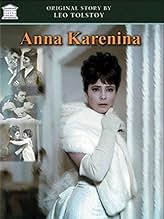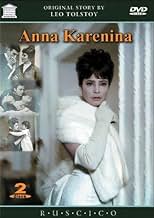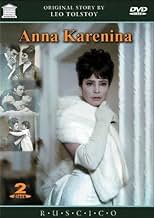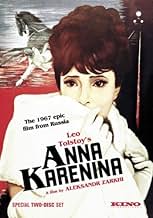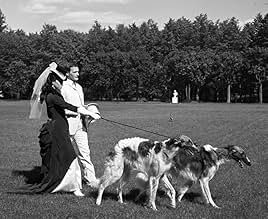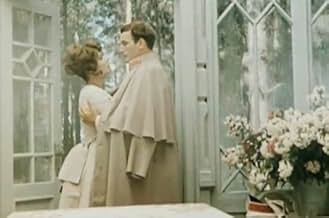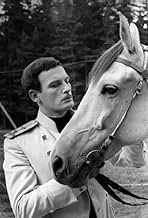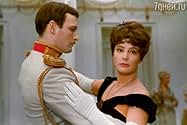IMDb RATING
7.0/10
1.1K
YOUR RATING
Anna Karenina is a young wife of an older husband. She has an affair with the handsome Count Vronsky. By following her desires Anna complicates her life.Anna Karenina is a young wife of an older husband. She has an affair with the handsome Count Vronsky. By following her desires Anna complicates her life.Anna Karenina is a young wife of an older husband. She has an affair with the handsome Count Vronsky. By following her desires Anna complicates her life.
- Director
- Writers
- Stars
Yuriy Yakovlev
- Stiva Oblonsky
- (as Yu. Yakovlev)
Boris Goldayev
- Konstantin Levin
- (as B. Goldayev)
Anastasiya Vertinskaya
- Kitty
- (as A. Vertinskaya)
Iya Savvina
- Dolly
- (as I. Savvina)
Maya Plisetskaya
- Knyagina Betsy
- (as M. Plisetskaya)
Lidiya Sukharevskaya
- Lidiya Ivanovna
- (as L. Sukharevskaya)
Elena Tyapkina
- Knyagina Myagkaya
- (as Ye. Tyapkina)
Sofiya Pilyavskaya
- Grafina Vronskaya
- (as S. Pilyavskaya)
Andrey Tutyshkin
- Lawyer
- (as A. Tutishkin)
Vasili Sakhnovsky
- Seryozha
- (as Vasya Sakhnovsky)
Anatoliy Kubatskiy
- Camerdiner Kapitonich
- (as A. Kubatsky)
- Director
- Writers
- All cast & crew
- Production, box office & more at IMDbPro
Featured reviews
This movie was done well. The filming was beautiful and Tolstoy's novel (in so far as it is possible) was presented in a good light. The only spot that marred an otherwise-good film was the performance of the leading actress, Samoilova, playing Anna Karenina herself. So inept, clumsy,, irritatingly false and unconvincing was her performance that my single greatest sentiment throughout the film was: "Come on! Throw yourself on the train-tracks and get it over with!" Sadly, for over two hours my prayers went unanswered. A positive note, however, was struck by the stunning performance of the former legendary ballerina, Maya Plisetskaya in her role as the social lioness, Princess Betsy Tverskaya. Vasilij Lanovoj (memorable as Shervinsky, in 'Dni Turbinykh) was also a pleasure to watch as he made the most out of the relatively small role of Vronsky. In short: This would be a higher-than-average film, but for the tragically poor performance of the single actress that was under particular obligation to play well.
for a part of its public, the best adaptation of the novel of Tolstoy. for me, one of good adaptation for the performance of Nikolai Gritsenko, who does a memorable Karenin and for Maya Plisetskaya. for few admirable scenes. for music. Tatyana Samoilova does a decent job. but she seems be prisoner of Veronika. and that fact becomes obvious scene by scene. she gives fragments from the image of Karenina. but the identification with the character seems be more than difficult. something missing. something impose to entire film to be out of psychology of her character. only her silhouette. sure, it is a beautiful film. but it is not the film of Samoilova. because she took , in real sense , the role in few scenes - first meeting with Vronsky, the dance with him, the dialogues with Karenin, the last meeting with Serioja. same situation for the too far by his character for Vasili Lanovoy. short, a beautiful adaptation. but its beauty is the only great virtue.
Previous to seeing this, the best version was Greta Garbo's with Vivien Leigh's close behind, while the Joe Wright-directed adapted fared least. Tolstoy's Anna Karenina is one of the greats of all Russian literature, and while this 1967 Russian version is not quite perfect and not for all tastes it does a great job with the story and gets closer than most of the other adaptations in capturing the detail and the spirit of the work, rather than just being the basic details in Cliff Notes version.
Some of the editing is a little abrupt in places and Anna and Vronsky seemed to fall in love too quickly, as if there was intended to be a few scenes in the film explaining Vronsky's infatuation that was cut out when it shouldn't have been. The print that the film comes in on the DVD is rather questionable, the constant colour shifts, the fading in and out, the washed out look and compression indicating a print that was badly damaged in the transfer.
Anna Karenina (1967) is, generally, visually well-made. The film contains some really striking cinematography, especially in the wonderfully delirious horse race scene and the tracking shots that allows one to admire all those splendid rooms and interiors in all their glory, haunting use of colour and 1860s Russia is evoked brilliantly in the truly sumptuous period detail. Rodion Shchedrin's music score is not for all tastes admittedly (with a few of the more dissonant parts a touch shrill), but this viewer found it beautiful and effectively chilling, the horse race and ballroom scenes being particularly well-scored.
The script is very literate and remarkably nuanced, capturing the spirit of Tolstoy's prose better than the other filmed versions. In terms of faithfulness, there could have been more with Anna and Vronsky's infatuation and descent into love, Levin is present but we don't get a sense of why he is so important a character and Levin and Kitty's subplot deserved better than being mentioned briefly. Other than those things though, this film is one of the more faithful, in detail and spirit, treatments of the book and despite the somewhat short length it has more depth than most of the other adaptations. There are some unforgettable scenes here, the horse race certainly is one but one cannot mention the very romantic ballroom scene, the scene in the theatre and the heart-wrenching suicide scene. The characters are still interesting, and the important parts of the story covered well, not just being a genuinely poignant love story but also a tense and unbearably tragic social drama too (one of the few Anna Karenina adaptations to achieve that balance).
The performances are uniformly good, with Tatyana Samoylova making for a very heartfelt Anna and bringing many nuances to the part in a way that was achieved by Garbo and not quite as much by the others. Vasily Lanovoy is a dashing Vronsky, but manages to bring depth to him, instead of being just a handsome heroic figure he is pretty un-heroic and unsympathetic actually. And there has unlikely been a more haunting Karenin on film than that of Nikolai Gritsenko. Yuri Yakovlev is amusing as Stiva, and Maya Plisetskaya (one of the greatest ballerinas of her day and of all time and wife of the film's composer Rodion Shchedrin) is a terrific Betsy.
In conclusion, imperfect but very good film, and compares extremely favourably with the rest of the Anna Karenina adaptations. 8/10 Bethany Cox
Some of the editing is a little abrupt in places and Anna and Vronsky seemed to fall in love too quickly, as if there was intended to be a few scenes in the film explaining Vronsky's infatuation that was cut out when it shouldn't have been. The print that the film comes in on the DVD is rather questionable, the constant colour shifts, the fading in and out, the washed out look and compression indicating a print that was badly damaged in the transfer.
Anna Karenina (1967) is, generally, visually well-made. The film contains some really striking cinematography, especially in the wonderfully delirious horse race scene and the tracking shots that allows one to admire all those splendid rooms and interiors in all their glory, haunting use of colour and 1860s Russia is evoked brilliantly in the truly sumptuous period detail. Rodion Shchedrin's music score is not for all tastes admittedly (with a few of the more dissonant parts a touch shrill), but this viewer found it beautiful and effectively chilling, the horse race and ballroom scenes being particularly well-scored.
The script is very literate and remarkably nuanced, capturing the spirit of Tolstoy's prose better than the other filmed versions. In terms of faithfulness, there could have been more with Anna and Vronsky's infatuation and descent into love, Levin is present but we don't get a sense of why he is so important a character and Levin and Kitty's subplot deserved better than being mentioned briefly. Other than those things though, this film is one of the more faithful, in detail and spirit, treatments of the book and despite the somewhat short length it has more depth than most of the other adaptations. There are some unforgettable scenes here, the horse race certainly is one but one cannot mention the very romantic ballroom scene, the scene in the theatre and the heart-wrenching suicide scene. The characters are still interesting, and the important parts of the story covered well, not just being a genuinely poignant love story but also a tense and unbearably tragic social drama too (one of the few Anna Karenina adaptations to achieve that balance).
The performances are uniformly good, with Tatyana Samoylova making for a very heartfelt Anna and bringing many nuances to the part in a way that was achieved by Garbo and not quite as much by the others. Vasily Lanovoy is a dashing Vronsky, but manages to bring depth to him, instead of being just a handsome heroic figure he is pretty un-heroic and unsympathetic actually. And there has unlikely been a more haunting Karenin on film than that of Nikolai Gritsenko. Yuri Yakovlev is amusing as Stiva, and Maya Plisetskaya (one of the greatest ballerinas of her day and of all time and wife of the film's composer Rodion Shchedrin) is a terrific Betsy.
In conclusion, imperfect but very good film, and compares extremely favourably with the rest of the Anna Karenina adaptations. 8/10 Bethany Cox
10Efenstor
Visually this movie is a black sheep among the other Soviet movies: it's shot absolutely astoundingly for a Soviet movie! Lighting and scenery are astonishingly crafted, wide-angle objectives, cranes and dollies are artfully used throughout the film making it look, despite of the poorly emulsified film (though not that bad for those times), like a highest-budget Hollywood movie. Photography direction and editing are also up to the highest notch! Direction and acting are great, no reason to praise anyone higher than the others (though my favourite is Nikolai Gritsenko as Alexander Alexandrovich Karenin). Truly a piece of a pure cinema art, absolutely creative, original and rich. Watch with pleasure.
I think that Aleksandr Zarkhi's adaptation of Leo Tolstoy's famous novel "Anna Karenina" is one of the best screen versions of the book. It was filmed on the locations where the novel's events took place, its characters speak in the original language, and the spirit of the book was successfully transferred to the screen mostly due to the performances and the cinematography by Leonid Kalashnikov.
Tatiana Samoylova (radiant Veronica of "The Cranes Are Flying") plays Anna exactly as Leo Tolstoy had intended her to be, a victim of overwhelming passion, a woman who had lost herself to love, for whom the whole world had concentrated in her beloved Alexei Vronskiy, and once she felt he had became tired of her, she simply could not and did not want to live. The world famous Soviet ballerina, Maya Plisetskaya took a role of Anna's friend, Princess Betsy Tverskaya and just to see her walk is worth watching the movie. There is much more in it. Some scenes are unforgettable after so many years. Among them, the Vronsky's horse race with the rapid cuts from the faces to horses' heads scene that has to be seen to believe; the first dance of Anna and Vronsky - during the dance the lives of many people had changed forever, or the scene in the theater where Anna dared to show up after she had left her husband and moved in with Vronsky. For a woman of her social position, it was absolutely shocking and totally unforgiving. She was crucified with the looks of the St. Petersburg's Aristocracy but she was standing on the balcony all alone, beautiful and smiling and no one knew what she was going through.
The original music for the film was written by Rodion Shchedrin who would write later the ballet based on "Anna Karenina" and his wife, Maya Plisetskaya will be dancing Anna - but it is a different story altogether
Tatiana Samoylova (radiant Veronica of "The Cranes Are Flying") plays Anna exactly as Leo Tolstoy had intended her to be, a victim of overwhelming passion, a woman who had lost herself to love, for whom the whole world had concentrated in her beloved Alexei Vronskiy, and once she felt he had became tired of her, she simply could not and did not want to live. The world famous Soviet ballerina, Maya Plisetskaya took a role of Anna's friend, Princess Betsy Tverskaya and just to see her walk is worth watching the movie. There is much more in it. Some scenes are unforgettable after so many years. Among them, the Vronsky's horse race with the rapid cuts from the faces to horses' heads scene that has to be seen to believe; the first dance of Anna and Vronsky - during the dance the lives of many people had changed forever, or the scene in the theater where Anna dared to show up after she had left her husband and moved in with Vronsky. For a woman of her social position, it was absolutely shocking and totally unforgiving. She was crucified with the looks of the St. Petersburg's Aristocracy but she was standing on the balcony all alone, beautiful and smiling and no one knew what she was going through.
The original music for the film was written by Rodion Shchedrin who would write later the ballet based on "Anna Karenina" and his wife, Maya Plisetskaya will be dancing Anna - but it is a different story altogether
Did you know
- TriviaFinal film of Lyudmila Semyonova.
- How long is Anna Karenina?Powered by Alexa
Details
- Release date
- Country of origin
- Official site
- Language
- Also known as
- Anna Karenina
- Filming locations
- Production company
- See more company credits at IMDbPro
- Runtime
- 2h 25m(145 min)
- Aspect ratio
- 2.20 : 1
Contribute to this page
Suggest an edit or add missing content

